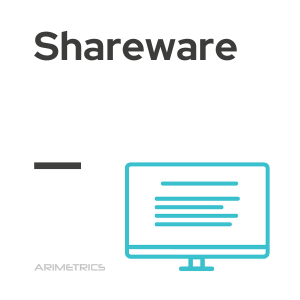
Definition:
Shareware is software distributed free of charge for your trial. The programs distributed with this type of license are usually old versions or with some limitations in the time of use, in functionalities or with notices on the screen indicating that they are trial versions.
Shareware programs are distributed with the aim that, after the trial, users acquire the paid version to obtain the latest version of the program with all its functionalities and without limitations. It is a marketing strategy very widespread in recent times.
The concept of shareware has its roots in the 1980s, when it began to become popular as an innovative way of distributing software. In its early days, shareware was distributed mainly through floppy disks and CD-ROMs, allowing users to try out the software before deciding to purchase the full version. This offered an affordable alternative to traditional distribution models, which required the purchase of the software without the possibility of prior testing.
With the advent of the Internet, shareware underwent a significant transformation. Digital distribution allowed software to reach a much wider audience and in a more efficient manner. Users could download programs directly from websites, eliminating the need for physical media and reducing distribution costs. This evolution kept the shareware model relevant and competitive in an ever-changing marketplace.
Today, shareware remains an effective strategy, especially on digital distribution platforms. It has given rise to similar business models, such as freemium, where a free version is offered with basic features while charging for advanced features. This adaptation has allowed developers to reach wider and more diversified audiences, demonstrating the flexibility and longevity of this approach in the software industry.
Shareware has not only influenced how software is distributed, but also how users interact with it, promoting a try-before-you-buy culture that benefits both developers and consumers.
The advantages of shareware include the following:
- No upfront cost: Users can install and use the program without any initial outlay, allowing them to evaluate whether the software meets their needs before making an investment.
- Easy access: These programs can come pre-installed on devices or can be easily found on the Internet for free download, making them easy to acquire.
- Sufficient functionality: Many times, the trial version offers sufficient features for the user, which can be useful for those who only need the software for a short period or for specific tasks.
Some of the drawbacks of shareware are:
- Interruptions: They may include pop-up windows with ads that interrupt the user experience, which can be annoying.
- Usage restrictions: They do not offer access to source code and do not allow free distribution, limiting flexibility for users who wish to customize the software.
- Limited security: As they are less tested, if not downloaded from trusted sources, they may be infected with malware, posing a security risk to the system.
- Vendor dependency: They are proprietary software, which means that they are completely dependent on the company that develops them, and any change in the vendor’s policy may affect the user.
- Limited support: As there is no upfront payment, adequate technical support is not always guaranteed, which can be a drawback in case of technical problems.
These are some programs that are distributed under shareware license:
- Winrar: program that allows you to compress and decompress files
- EASEUS Partition Master: Hard Drive Partitions
- Malwarebytes– Antivirus for Malware Scanning and Removal
